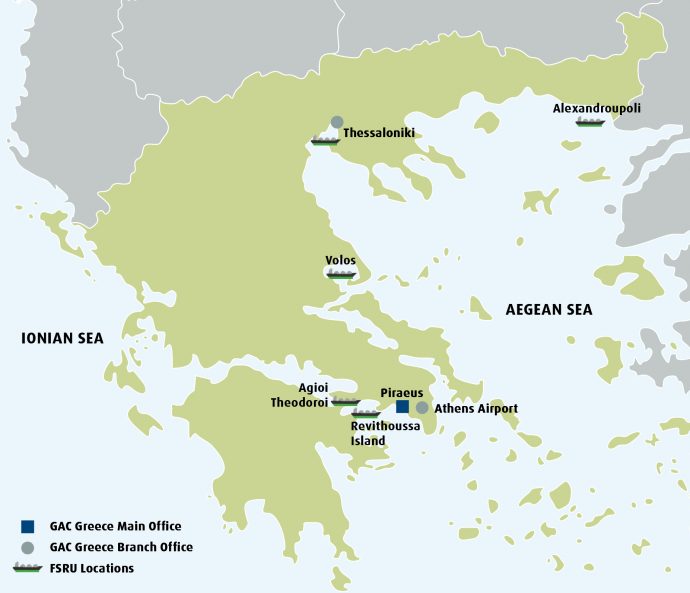There is a wave of change rippling through the azure seas surrounding Greece.
As the European Union tilts its focus to green energy, the Greek government has pledged to cease coal-powered electricity generation. And as pressure mounts to move away from Russian fossil fuels, the country is looking to use its strategic position in the Eastern Mediterranean to become a major energy gateway for south-east Europe.

Alternative supply route
Greek authorities are determined to increase the ratio of electricity generated by comparatively eco-friendly Liquefied Natural Gas (LNG).
An additional Floating Storage Regasification Unit (FSRU) licence has been approved for the northern port of Alexandroupoli, which is expected to bolster Greece’s energy security, enhance its regional strategic role and provide an alternative natural gas supply route. At the inauguration of the project, Prime Minister Kyriakos Mitsotakis said it will be a “new energy gateway” that will help Europe and the Balkans become less reliant on Russian supplies.
Growing capacity
Just days after the Alexandroupoli plans were announced, the Greek Regulatory Authority for Energy announced that a licence had been granted to expand the LNG port on the island of Revithoussa in Elefsis Bay, west of Athens, which has long been supported by GAC Greece.
The plan is to introduce an FSRU at Revithoussa in July this year to boost the capacity of the port’s connection to the Greek and European networks by about 50%, from current levels of about 225,000 m³ to 375,000m³.

FSRUs: fast and efficient
Reflecting the ease, speed and efficiency with which FSRUs allow entry points to be established, a further floating LNG facility is imminent near Agioi Theodoroi, Corinth. There are also plans to deploy a second unit at Alexandroupoli and another two at Thessaloniki and Volos.
Jointly, these will yield a total regasification capacity of 8,500,000 m³, enabling Greek LNG stations to cover not only the Greek market but also its neighbours. Alexandroupoli and Thessaloniki will be well placed to help meet the needs of consumers in countries like Bulgaria and North Macedonia.
Increased consumption
According to CEEnergyNews and natural gas transmission operator DESFA, 2021 was a record year for natural gas consumption in Greece. Domestic gas usage was up nearly 11% on the previous year, although LNG imports through Revithoussa were lower than in 2020. Figures for imports from the USA and Qatar fell by 27% and 45% respectively, but volumes rose from Algeria (60%) and Egypt (30%). The USA remains the largest LNG contributor in Greece, delivering more than 50% of all imports.
Other developments in renewables
It’s not just LNG where significant strides are being taken. In May this year, ekathimerini.com reported that floating wind turbines will be manufactured in Greece. While onshore windfarms have been present all over Greece for years, the investment by Viohalco, near Volos, is set to make Thessaly “a point of reference for the [offshore] European floating wind farm market" which will be “the world’s first industrialised production unit for floating wind turbines”. The Ionian Sea and Crete are also being considered for offshore wind energy installations.
Established support
While cleaner, greener fuel options are taking off in a big way in Greece, LNG support has been a part of the country’s energy profile for more than a decade. From the earliest days, GAC Greece has supported FSRU and vessel operations with its combination of ship agency, logistics and offshore services, from its offices in Piraeus and Thessaloniki. Successfully coordinating the often complex discharging operations whilst also attending to the needs of LNG carriers in Greek waters is just another day in the office for GAC Greece!